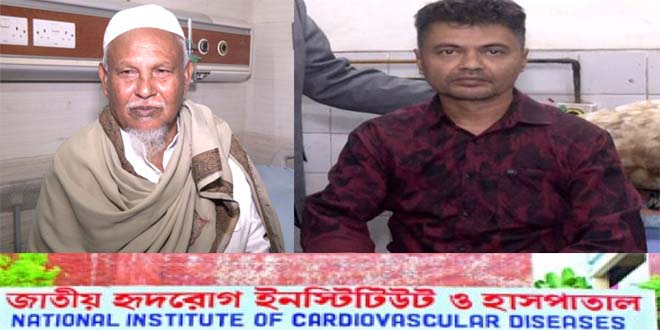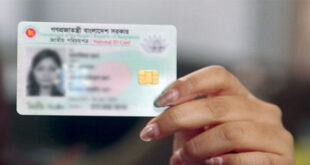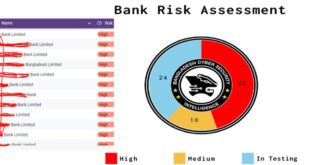On Sunday (January 21) Bangladesh’s only specialized institution, National Institute of Cardiovascular Diseases, entered the era of robotic services by fitting free robotic rings in the main arteries of two heart patients.
The work was completed very efficiently by the associate professor Dr. Pradeep Kumar Karmakar and his specialized team and this treatment was inaugurated by the Director of National Heart Institute and Hospital Prof. Dr. Md. Kamrul Hasan Milan and Head of Department of Cardiology Prof. Dr. Md. Salahuddin.
Robotic Angioplasty is a groundbreaking and cutting-edge heart treatment procedure for any country. This procedure is the first time any medical service has been provided in Bangladesh.
There are 160 robotic angioplasty centers in the world, including the United States and India, including six centers in India. Through this treatment, Bangladesh and the National Institute of Cardiovascular Diseases have entered the robotic era.
Robotic Angioplasty is the most modern and latest technology of heart ringing in today’s world. Cardiologists still perform heart rings from patients themselves in the cathlab. The latest invention is robotic angioplasty i.e. heart ringing by robots.
Through this, cardiologists place the rings in the heart arteries of heart patients accurately from a distance from the patient. This robot has two parts, one is a robot arm which is placed in the cath lab, and the other is a control section from where the main cardiologist completes the entire ringing process remotely.
Dr. Pradip Kummar karmakar, Associate professor of Cardiology at National Institute of Cardiovascular Diseases said, Robotic angioplasty or robotic heart ring has three benefits one is benefit to the patient, second is benefit to the cardiologist who wears the ring and third is benefit to the country.
The first advantage of robotic angioplasty is that the complex process of placing the heart ring can be done very precisely and accurately by a robot. Sometimes it is necessary to move one millimeter forward or one millimeter backward to position the heart ring perfectly, but it is difficult to do this precisely by hand. It can be done precisely. Another advantage for patients is that cardiologists can perform direct angioplasty in a much shorter time than robotically, which allows more patients to be treated in less time. The shorter the length of time the ring is in place, the safer it is for the patient, thus the less time required to wear the ring with robotic angioplasty, the less complications there are.
Dr. Farhana Ahmed, assistant professor, cardiology at National Institute of Cardiovascular Diseases said, The benefits of robotic angioplasty for doctors are that doctors who perform a lot of angioplasty at some point face two problems. First, many doctors are at risk of various types of cancer, including brain cancer and eye cataracts due to radiation. In addition, when cardiologists work in the operating theater or cath lab, radiation protection is required.
They have to wear a special garment weighing 12 to 15 pounds for a long time, which puts pressure on the nerves in the neck, and later the doctor cannot perform angioplasty due to neck and arm pain due to standing for a long time. Currently, many senior interventional cardiologists are unable to provide treatment for this problem. Through angioplasty, without radiation and without wearing heavy special clothing, the heart ring can be worn in the control room of the cathlab, in his office, at home if facilities are available, or even from abroad via the Internet.
The biggest advantage for the country is that when this modern medical technology is introduced, the patient no longer has to go outside the country. Every year, many people go to different countries including India, Singapore for robotic treatment. This service can be provided to the patients and thereby save a lot of foreign exchange and a lot of money will remain in the country
Dr. Pradip Kummar karmakar said, The present machine has been brought from France for one month use to check if it is compatible with infrastructure in Bangladesh. It will go back to France after one month.
So, if we are success at the pilot program, we will approach to the Gov.t to procure it for the betterment of the country permanently. And at a very low cost, this international state-of-the-art technology will be able to keep the National Institute of Cardiovascular Diseases running for all time.
Robotic Angioplasty has not yet started in any government or private hospital in Bangladesh, Dr. Pradeep Kumar Karmakar is the first doctor in the country who has trained on this Robotic Angioplasty. If the government provides this robotic system to the National Institute of Cardiovascular Diseases, Dr. Pradeep Kumar Karmakar and his skilled team are fully trained all the time. This latest treatment method can provide health services to the people of Bangladesh
Almost most of the equipment including medicines in the government hospitals are provided by the government. In this case, if the equipment used in robotic angioplasty is provided by the government, then the doctors of the National Institute of Cardiovascular Diseases are completely free of cost.
Professor Md. Kamrul Hasan Milon, Director of National Institute of Cardiovascular Diseases said, we are happy to do robotic ring placement in the first time in Bangladesh. After the trial period we will approach the Gov.t basis on the success report.
 InfoSecBulletin Cybersecurity for mankind
InfoSecBulletin Cybersecurity for mankind














